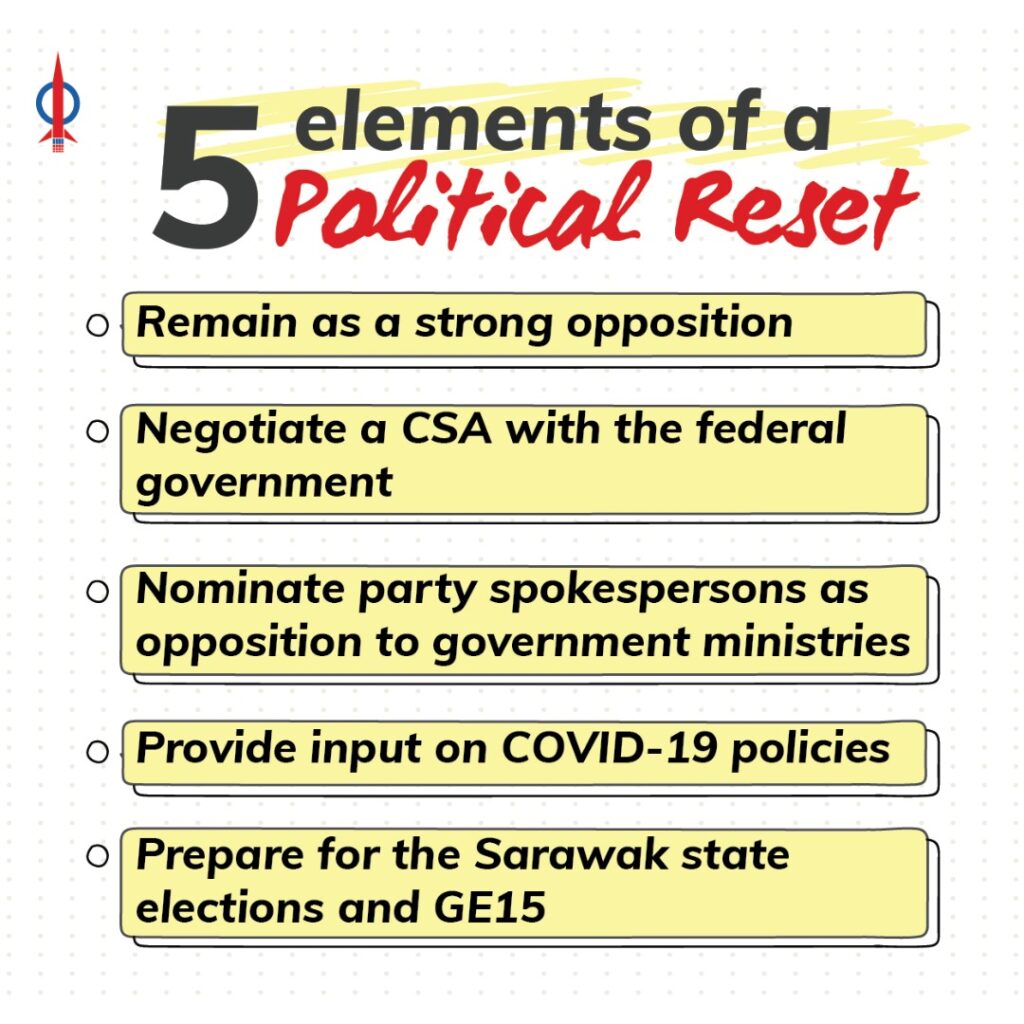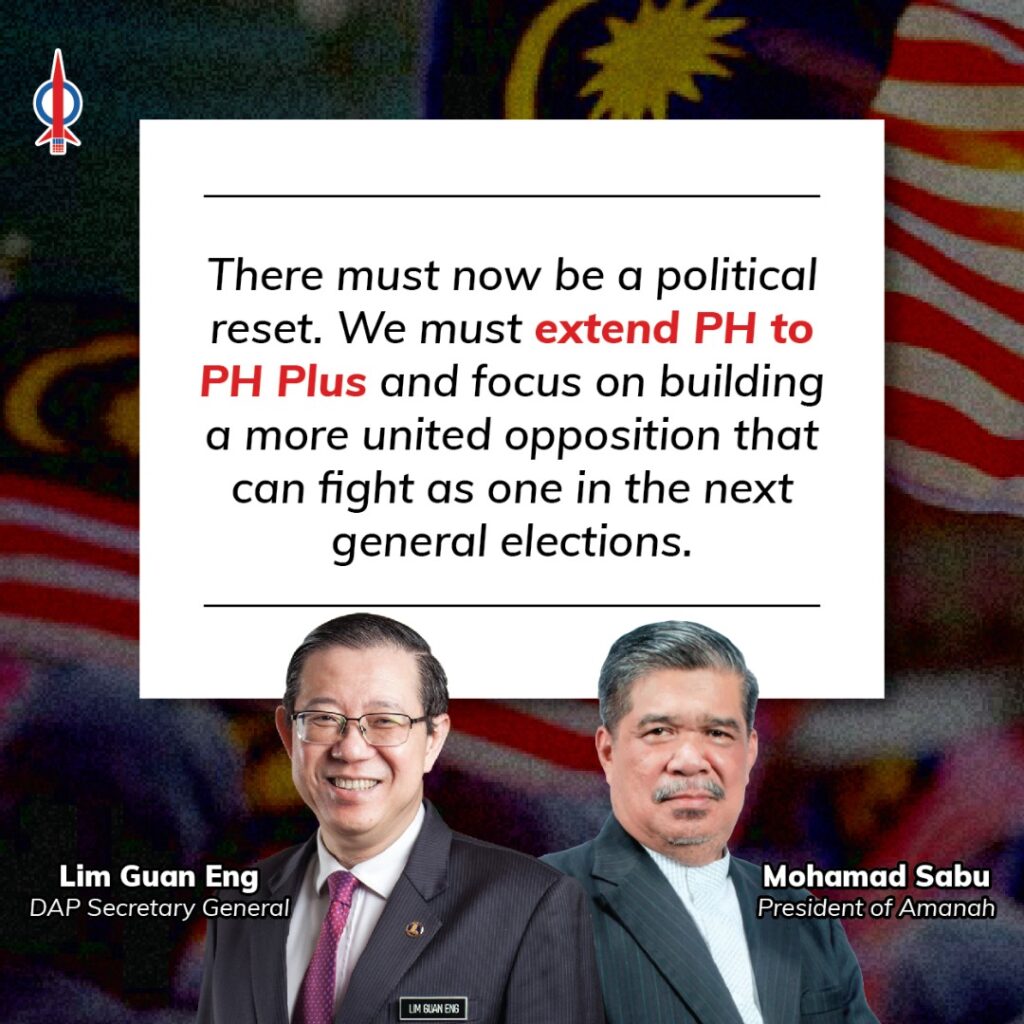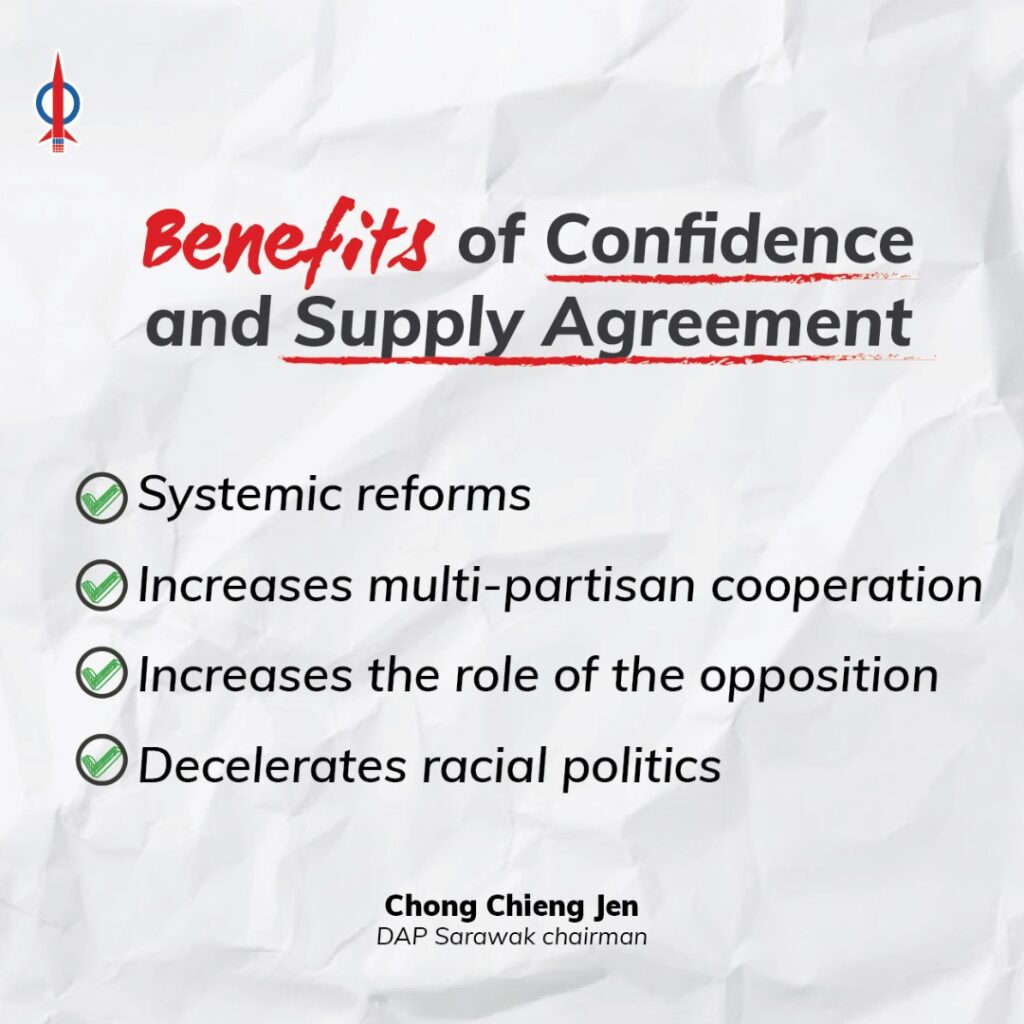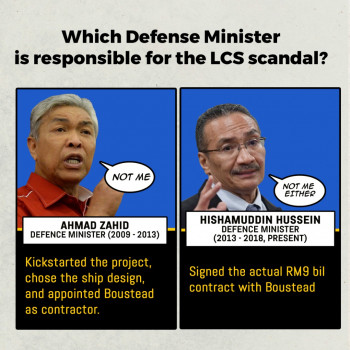
The recent parliamentary session concluded with the passing of the 2021 budget in the Dewan Rakyat at the 3rd and Final Reading with a razor thin majority of just three votes (111 to 108).
Subsequently, a few key Pakatan Harapan (PH) leaders, namely Lim Guan Eng from the DAP and Mohamad Sabu from AMANAH, called for a “Political Reset” to consolidate the strength of the 108 opposition Members of Parliament (MP) in the Dewan Rakyat. A press statement issued by both leaders stated “This is the reality that PH must face, the need for a political reset to focus on uniting our friends amongst the opposition MPs who stood by us on Tuesday. PH should not be wasting time on opportunistic government backbenchers exploiting PH for their own private benefit to get more and more lucrative deals from the PN government”.

I fully support this call for a “Political Reset”. For me, this reset should incorporate FIVE important elements which will strengthen the opposition bench and lead us forward together in a strategic and focused manner. These elements are:
(i) Maintaining our position as a strong opposition until the next general election (GE15)
(ii) Negotiate a Confidence and Supply Agreement (CSA) with the federal government as part of the institutional and democratic reform process
(iii) Nominate spokespersons from each party to play the role of check and balance on each government ministry
(iv) Provide inputs and recommendations on COVID related measures across the policy spectrum
(v) Prepare for the upcoming Sarawak state elections and also GE15
(i) Maintaining our position as a strong opposition until the next general election (GE15)
While the opposition MPs from PH, Warisan, Pejuang, MUDA and independents have tried our best to play an effective role of check and balance during the last two parliamentary sessions, the reality is that we have been inevitably distracted with discussions of the PN government losing a motion of confidence and subsequently, being replaced by a new government. This distraction or confusion was made most apparent during the decision at the last minute not to call for a vote by division (“belah bahagi) during the conclusion of the 2nd reading of Budget 2021.
Rather than continue to be distracted by further schemes and backroom dealings to cause the fall of the PN government and form a new government, we should instead focus our energies on consolidating the strength of the existing 108 opposition MPs in order to form the strongest opposition bench in Malaysian history. As much as I STRONGLY OBJECT to the manner which this PN government was formed, the truth of the matter is that a new government that would replace the PN government would likely NOT have a sizable majority and would be beset by the same threats of political ‘blackmail’ which Prime Minister Muhyiddin Yassin is currently facing from certain leaders from UMNO. Like it or not, another change in the federal government through non-electoral means will further destabilize the political landscape in Malaysia. This will also negatively affect the nascent economic recovery, drive investor confidence in the country down further and potentially disrupt the COVID related rollout plans which have been put in place.
We should let the voters decide on the next federal government at the next general elections. Let the voters judge between the 22nd months of the PH government and the governing record of the current PN government at GE15. We should spend the time from now until the next GE to consolidate the strength of the 108 opposition MPs and to play the most effective role of check and balance that a STRONG, FORMIDABLE and CONVINCING opposition bench can play.
(ii) Negotiate a Confidence and Supply Agreement (CSA) with the federal government as part of the institutional and democratic reform process
Once we are clear that we will maintain our position as an effective opposition, we would be in a better position to negotiate for a Confidence and Supply Agreement (CSA) with the PN federal government. A precedent has been set in Perak, where under the new Menteri Besar, it was decided that all state representatives / ADUNs would receive an equal allocation from the state government and opposition ADUNs would be able to attend district level committee and taskforce meetings.[2] This CSA was carried out in the interest of political stability for the state government and also as part of a process of institutional and democratic reforms in the state.

A similar arrangement should be made at the federal level whereby opposition MPs will receive their fair share of their federal constituency allocation as part of a larger package of institutional and democratic reforms. This should include opposition MPs being invited to attend certain government meetings such as the Economic Action Council, as was proposed by the Prime Minister in early November and allow opposition MPs to be invited to schools and other government institutions in their respective constituencies.[3]
Such an arrangement would set a much welcomed precedent in terms of institutional reform for future parliaments so that opposition MPs and their voters are not unfairly discriminated against. It would also provide the Prime Minister with some breathing room so that he is not ‘blackmailed’ into agreeing to demands by certain government MPs – to drop charges against them, for example – in exchange for their support in parliament.
(iii) Nominate spokespersons from each party to play the role of check and balance on each government ministry
There have been some suggestions for PH to form a shadow cabinet as part of being an effective opposition bench. Unfortunately, any such move by PH will give ammunition for irresponsible quarters to play the race and religion card. Such a move would also cause unnecessary tension with PH and between PH and other opposition forces such as Warisan and PEJUANG. What ‘shadow’ positions should be given to Dr. Mahathir, Shafie Apdal and Mukhriz Mahathir, for example?
It would be better for each party to nominate key spokespersons for the various ministries. There is already a natural allocation which has taken place with former Ministers and Deputy Ministers ‘shadowing’ their former Ministries. Other opposition backbenchers who were previously not part of the government also can ‘shadow’ the ministries which they are naturally interested in.
The roles of these spokespersons can be bolstered by giving them more prominent speaking roles during parliamentary debates involving the ministries they are shadowing. The speaker and deputy speakers should also be made aware of the role of these spokespersons so that they stand a higher chance of being selected by the speaker to ask additional questions pertaining to the Ministries they are shadowing during the Q&A sessions in parliament. Joint press conferences can be held by these spokespersons on the ministries they are shadowing.
These spokespersons should be named publicly by the respective opposition parties and coordination between the parties can take place thereafter.
(iv) Provide inputs and recommendations on COVID related measures across the policy spectrum
Malaysia and the rest of the world are suffering from an unprecedented health and economic crisis as a result of the COVID 19 pandemic. The challenges as a result of COVID 19 has hit every single corner of life in the country and beyond. Such unique challenges require unique responses. Opposition MPs have provided clear recommendations in specific policy areas related to the COVID 19 response. Whether it is better data sharing with the state governments[4], pressuring the government to extend the loan moratorium to a larger segment of the population[5], setting up a rental relief fund for SMEs[6], setting up a constituency employment center for those who looking for jobs[7], asking the government to reconsider the blanket closure of schools[8], proposing an economic recovery plan for Sabah[9], these are just some examples of opposition MPs proposing clear alternative policy recommendations in relation to the COVID crisis.
Ideally, we should be presenting clear COVID related policy responses in ALL sectors of social and economic life but this requires greater focus and coordination among the opposition leadership.
(v) Prepare for the upcoming Sarawak state elections and also GE15
Finally, rather than be distracted by attempts to replace the current PN government, the opposition MPs should be focused on preparing for the upcoming Sarawak state elections, due to be held in 2021, and also possibly GE15 which may also be held in 2021.
It would be better for any elections to be held off until the COVID vaccines are fully deployed throughout the country in order to prevent another spike in COVID cases (as was the case after the Sabah state elections) but the current government may feel otherwise. Regardless, preparations need to begin and these preparations would not be effective if there was still uncertainty as to whether or not a new government can replace the PN government through non-electoral means in the near future.
In conclusion, a political reset led by PH does not require there to be a leadership change in PH. What it does require is a change of direction and focus given by the PH leadership. And it starts with building a strong, formidable and convincing opposition bench which can play an effective role of negotiating with and checking on the current government.
Dr. Ong Kian Ming
Member of Parliament for Bangi



